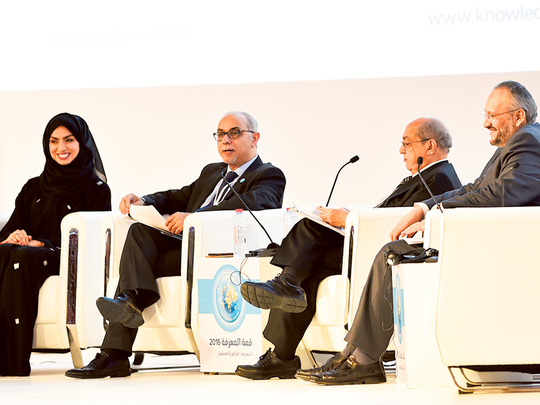
Dubai: The UAE is the fourth best-read country among 22 Arab countries surveyed in the Middle East and North Africa region, according to the Arab Reading Index 2016 released on Tuesday.
The average UAE reader spends 57 hours reading 24 books per year, 18 of them in Arabic language with the remaining eight books in foreign languages, suggested the the new index.
The survey is the brainchild of Mohammad Bin Rashid Al Maktoum Foundation (MBRF) in partnership with the United Nations Development Programme (UNDP) to measure literacy in the region in order to build upon reading, the first pillar of knowledge.
The index was released at the third annual Knowledge Summit in Dubai on Tuesday, hosted by MBRF which noted that 148,000 respondents were involved in the survey in 22 countries to create a first-of-its-kind database to help countries plan future education, societal and government strategies.
In the UAE, 81 per cent of the 5,400 survey respondents said they believed “reading is an essential need in life” and a further 86 per cent agreed that “reading doesn’t end with graduation”.
As many as 76 per cent of UAE respondents said they “respect people who read” while 50 per cent said that “reading is important in the family”.
Jamal Bin Huwaireb, managing director of MBRF, told delegates during the release of the index at the Knowledge Summit that the new numbers are based on fact and vary widely from the findings in a 2011 report that those in the Arab region spend only six minutes a year reading a quarter of page as compared to Americans who reportedly read 11 books a year.
He said many Arabs took umbrage at such a ridiculous number, noting that affixing an annual reading time within only minutes was completely “illogical”.
The new Arab Reading Index, he said, shows that Arabs across the region are avid readers while in school and later in adult life.
The index findings are important, said Huwaireb, “to observe reality in the Arab world based upon facts ... and to be able to measure the influence of such initiatives on societies”.
Huwaireb said that he “hoped [the] index will be a guidance” for all involved to read more to gain lifelong learning towards the ultimate goal of knowledge.
Dr Najoua Ghriss, Professor of Higher Institute of Education and Continuous Training in Tunisia, welcomed the substantive data provided by the Arab Reading Index and lauded the UAE for seeking clarity on regional literacy.
“We need such an index in the Arab world to take social and economic development to a higher level,” Ghriss said. “We can’t envision a community or society acquiring knowledge without being a reading one.”
Ghriss said people should not underestimate the power of literacy and said the more the youth “read, the more enlightened and the more open minded and learned they become. This is a main drive for students to rediscover the pleasure of reading. Reading does not stop at the classroom door, it is something that stays with you all of your life”.
Top five Arab countries that read per year
Egypt
64 hours of reading
27 books
Lebanon
59 hours of reading
29 books
Morocco
57 hours of reading
27 books
UAE
57 hours of reading
24 books
Jordan
50 hours of reading
21 books
Source: Arab Reading Index available at www.knowledge4all.com








